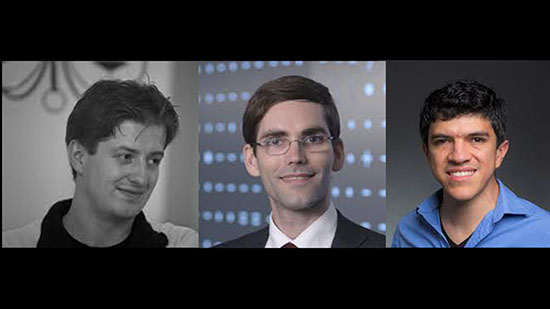Three EECS professors receive fellowships for early stage research

Faculty Research Innovation Fellowship recipients (from left) Professors Wojciech Matusik, Tomas Palacios, and Armando Solar-Lezama
EECS Staff
EECS has awarded its 2020 Faculty Research Innovation Fellowships (FRIFs) to Professors Wojciech Matusik, Tomás Palacios, and Armando Solar-Lezama, department head Asu Ozdaglar announced recently.
Matusik received a Frank Quick Faculty Research Innovation Fellowship, created through the generosity of EECS alumnus Frank Quick ’69, SM ’70. Palacios and Solar-Lezama received Thornton Family Faculty Research Innovation Fellowships, created through the generosity of Richard Thornton, SM ‘54, ScD ’57, an EECS faculty member for more than 40 years.
The fellowships were established to recognize midcareer faculty members for outstanding research contributions and international leadership in their fields. The FRIFs provide tenured faculty with resources to pursue new research and development paths, and to make potentially important discoveries through early-stage research. Following is more information about each recipient:
Wojciech Matusik is a professor of EECS and a principal investigator in the Computer Science and Artificial Intelligence Laboratory (CSAIL), where he leads the Computational Fabrics Group and is a member of the Computer Graphics Group. His research interests are in computer graphics, computational design and fabrication, computer vision, robotics, and human-computer interaction (HCI). Before joining MIT, he worked at Mitsubishi Electric Research Laboratories, Adobe Systems, and Disney Research Zurich. In 2004, he was named one of the world’s top 100 young innovators by MIT’s Technology Review. He has also received the Significant New Researcher Award from ACM SIGGRAPH, the DARPA Young Faculty Award, a Sloan Research Fellowship, and MIT’s Ruth and Joel Spira Award for Excellence in Teaching. He received a PhD and SM from MIT and a BS from the University of California at Berkeley.
Tomás Palacios is a professor of EECS and a core faculty member in the Microsystems Technology Laboratories (MTL). . His research interests are in semiconductor device physics, nanotechnology, and electronics. Palacios heads MTL’s Advanced Semiconductor Materials and Devices Group, is the founding director of the MIT Center for Graphene Devices and Two-Dimensional (2-D) Systems, and director of the MIT Gallium Nitride (GaN) Energy Initiative. Since 2015, he has also directed the EECS 6-A Master’s in Engineering Thesis Program, which allows students to pursue innovative industry projects while simultaneously completing their MEng theses. He is an IEEE Fellow, has been named multiple times as a Thompson Reuters Highly Cited Researcher, and has received many other honors, including a DARPA Young Faculty Award, a National Science Foundation (NSF) CAREER Award, and the Agustin de Betancourt Award, Spain’s highest honor for a young engineer. He received PhD and MS degrees from the University of California at Santa Barbara and a BS/MSc from the Polytechnic University of Madrid in Spain.
Armando Solar-Lezama, recently promoted from associate to full professor of EECS, is also a principal investigator in CSAIL. He is a leader in the expanding field of software synthesis, and in the emerging interdisciplinary field of PLML, or “programming languages meet machine learning.” Solar-Lezama heads CSAIL’s Computer-Assisted Programming Group, which focuses on program synthesis, a research area at the intersection programming systems and artificial intelligence. His work has earned several best-paper awards, including from the ACM Special Interest Group on Programming Languages (SIGPLAN) Conference on Programming Language Design and Implementation (PLDI), the ACM Special Interest Group on Management of Date (SIGMOD) Conference, the ACM Symposium on Operating Systems Principles (SOSP), and the Conference on Innovative Data Systems Research (CIDR). Solar-Lezama received a PhD from UC Berkeley and bachelor’s degrees from Texas A&M University.
Media Inquiries
Journalists seeking information about EECS, or interviews with EECS faculty members, should email eecs-communications@mit.edu.
Please note: The EECS Communications Office only handles media inquiries related to MIT’s Department of Electrical Engineering & Computer Science. Please visit other school, department, laboratory, or center websites to locate their dedicated media-relations teams.